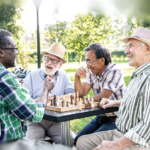 Maintaining an active social life can reduce the risk of cognitive decline, dementia, and Alzheimer’s disease among elderly people through various mechanisms, primarily by promoting mental, emotional, and physical well-being. Here’s how social engagement contributes to cognitive health.
Maintaining an active social life can reduce the risk of cognitive decline, dementia, and Alzheimer’s disease among elderly people through various mechanisms, primarily by promoting mental, emotional, and physical well-being. Here’s how social engagement contributes to cognitive health.
Stimulates cognitive functions
Engaging in conversations, participating in group activities, and playing games have been shown to stimulate cognitive functions, such as memory, problem-solving, and decision-making. Regular cognitive stimulation can help maintain and even improve cognitive abilities.1,2
Supports emotional well-being and reduces depression and anxiety
Socializing has been shown to reduce feelings of loneliness and depression, which are risk factors for cognitive decline.3 Positive social interactions provide emotional support, which has been shown to reduce stress and symptoms of posttraumatic stress disorder and promote overall emotional well-being.4,5
Builds and maintains brain reserve and cognitive reserve
Active social engagement has been associated with building cognitive reserve and brain reserve. Cognitive reserve refers to the brain’s ability to withstand damage or compensate for cognitive decline during the natural aging process. Brain reserve refers more to the actual size of the brain, in that the larger the brain, the more adaptable it is and more likely it can still function normally while withstanding damage due to aging. Both cognitive reserve and brain reserve are primarily developed earlier in life through interpersonal engagement and education; however, social interaction later in life has been shown to preserve and stimulate cognitive reserve and brain reserve.6–8
Helps us make better lifestyle choices
Maintaining an active social life has been linked to making healthier lifestyle choices, such as staying physically active, eating well, and getting regular medical check-ups. These lifestyle factors can collectively contribute to better cognitive health as we age.9–11
Improves quality of life and motivation
Social engagement has been shown to provide a sense of purpose and motivation for elderly individuals to stay active, seek new experiences, learn new things, and maintain overall health. The motivation to engage in healthy lifestyle choices is related to the self-determination theory, which comprises three basic needs: competence, relatedness, and autonomy. In other words, social engagement plays a big role in our ability to stay motivated to engage in a healthy lifestyle, including eating well, staying physically active, and challenging ourselves to learn and adapt to new things. In turn, a healthy lifestyle reduces risk of cognitive decline and increases overall quality of life as we age.12,13
In summary
While social engagement is a valuable component of cognitive health, it should be part of a holistic approach that includes a balanced diet, regular physical activity, cognitive stimulation, and healthcare management. It’s important to consult healthcare professionals for personalized advice and to monitor cognitive health over time. Please note that while the provided sources offer valuable information, research in the field of cognitive health is ongoing, and new findings may emerge over time.
Sources
- Krell-Roesch J, Syrjanen JA, Vassilaki M, et al. Quantity and quality of mental activities and the risk of incident mild cognitive impairment. Neurology. 2019;93:e1–e11.
- Cohn-Schwartz E. Pathways from social activities to cognitive functioning: the role of physical activity and mental health. Innovat Aging. 2020;4(3): igaa015.
- American Psychological Association website. Manage stress: Strengthen your support network. 21 Oct 2022. https://www.apa.org/topics/stress/manage-social-support. Accessed 26 Sep 2023.
- Salinas J, Beiser AS, Samra JK, et al. Association of loneliness with 10-year dementia risk and early markers of vulnerability for neurocognitive decline. Neurology. 2022;98(13):e1337–e1348.
- Choi KW, Stein MB, Nishimi KM, et al. An exposure-wide and Mendelian randomization approach to identifying modifiable factors for the prevention of depression. Am J Psychiatry. 2020;177(10):944–954.
- Marseglia A, Kalpouzos G, Laukka EJ, et al. Social health and cognitive change in old age: role of brain reserve. Ann Neurol. 2023;93(4):844–855.
- Du C, Miyazaki Y, Dong XQ, Li M. Education, social engagement, and cognitive function: a cross-lagged panel analysis. J Gerontol B Psychol Sci Soc Sci. 2023 Jun 9:gbad088.
- Peng S, Roth AR, Apostolova LG, et al. Cognitively stimulating environments and cognitive reserve: the case of personal social networks. Neurobiol Aging. 2022;112:197–203.
- Maharjan R, Diaz Bustamante L, Ghattas KN, et al. Role of lifestyle in neuroplasticity and neurogenesis in an aging brain. Cureus. 2020;12(9):e10639.
- Holt-Lunstad J, Smith TB, Layton JB. Social relationships and mortality risk: a meta-analytic review. PLoS Med. 2010;7(7):e1000316.
- Yang YC, Boen C, Gerken K,et al. Social relationships and physiological determinants of longevity across the human life span. Proc Natl Acad Sci U S A. 2016;113(3):578–583.
- Martino J, Pegg J, Frates EP. The connection prescription: using the power of social interactions and the deep desire for connectedness to empower health and wellness. Am J Lifestyle Med. 2015;11(6):466–475.
- Lopez-Garrido G. Self-determination theory: how it explains motivation. 10 Jul 2023. Simply Psychiatry website. https://www.simplypsychology.org/self-determination-theory.html. Accessed 27 Sep 2023.





